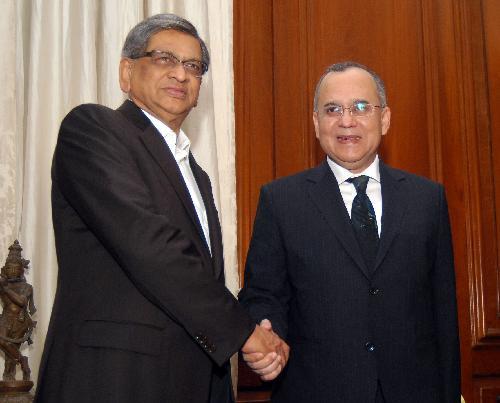Talks between Pakistan and India face hurdles
The talk process between Pakistan and India is being faced with hurdles after they opened the door when the two countries held their first official talks in late February in 15 months after the Mumbai attacks.
|
|
Pakistani analysts said that Pakistan and India once again made a futile effort to make a breakthrough in the fresh round of talks as Mumbai attacks and Kashmir dispute were the main hurdles, which also plague the peace-loving people across the borders.
Pakistani Foreign Office said Thursday that Pakistan is not pleased with India's reaction to the resumption of the composite dialogue between the two neighbors.
"Pakistan wants composite dialogue not talks and we do not want talks for the sake of talks as India is not ready to resume composite dialogue process," said Foreign Office spokesman Abdul Basit.
Basit said that India is not admitting Pakistan's role in eliminating terrorism.
Pakistan and India held their first talks in New Delhi on Feb. 25, 15 months after the Mumbai attacks in 2008 that dumped the peace process between the two nuclear-armed nations.
In the talks both the countries discussed issues of their interests and agreed to continue talks but India stuck to its stance over Mumbai attacks and Pakistan's firmed position on core issue of Kashmir led to no substantial results at the moment and composite dialogue process could not be resumed.
On the second day of talks, India announced its annual budget and increased its defense budget by 24 percent, which Paksitani media believe could be perilous for the balance of power in the region.
Indian Finance Minister Parnab Mukerjee presented the 2010-11 annual budget in which India allocated 1,470 billion Indian rupees (about 32.1 billion U.S. dollars) for defense expense and this increase reached the increment to 100 percent in the last three years.
Pakistani Prime Minister Syed Yousuf Raza Gilani said on Feb. 26 that Pakistan would raise the increase in Indian current defense budget with international community.
Analysts in Pakistan believed that India always follows the policy to go one step ahead and two steps back and it will hamper the way forward for resolving issues.
They said that Pakistan does not want to limit the talks to terrorism because it is sensitive of Indian criticism of not doing enough to dismantle anti-India Pakistani militant groups.
If India restricted talks to terrorism, the two arch rivals could not make any progress, they warned. They said that politicians in both the countries should avoid giving instigating statements against each other because often hectic efforts by certain quarters to prepare grounds for talks are neutralized by such statements and unnecessary display of muscles.
Pakistani former foreign minister Khurshid Kasuri told Xinhua that holding talks is important but there should be some fruitful outcomes of the talks otherwise there will be no development to resolve problems that keep both the countries in dilemma.
Analyst and former Pakistani foreign secretary Najamuddin Shiekh said that it is a breakthrough to resume dialogue process and at the moment Indian authorities are trying to calm down their public opinion but if they remained stuck to their stance then it would be a waste of time.
"Talks should be result-oriented and in the first round of talks both the countries should resolve those issues over which both can easily agree as it will be helpful in confidence-building measure and to create favorable environment to go ahead," Shiekh said.
He said that Kashmir problem should be discussed and the back channel negotiation is a best option for resolving the decades-old issue but at the moment no one can say that Pakistan and India could make any progress to chalk out a plan for resolving the Kashmir issue.
Media reports suggested that the Bharatiya Janata Party (BJP), India's main opposition party, on Wednesday blamed the Indian government of setting up a "clandestine Kashmir agreement" with Pakistan.
During Indian Parliament (Lok Sabha) proceedings, BJP leader LK Advani blamed Indian Prime Minister Manmohan Singh of organizing for a "clandestine" deal with Pakistan for secession of Indian- controlled Kashmir in the name of granting it autonomy.
 0
0 







